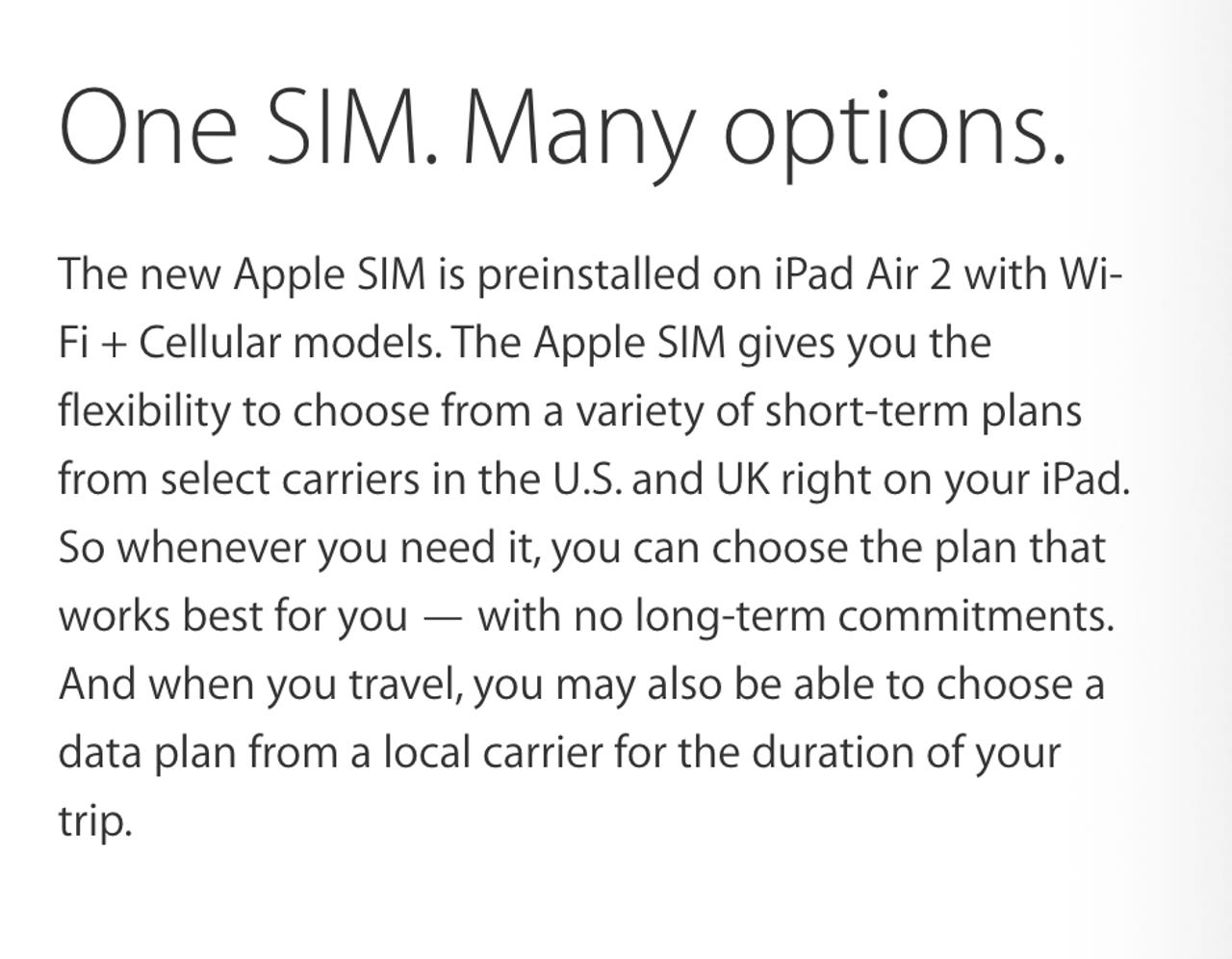Apple's One SIM to rule them all

Not content with the over-the-top players already undermining many of the traditional mobile telco's revenues in voice and SMS, in its iPad Air 2, Apple is venturing further onto the turf of mobile telecommunications companies by allowing customers to switch telcos without having to switch SIMs.
Quietly included in Apple's announcement of the iPad Air 2, Apple has revealed that users with the Wi-Fi and cellular models in the US and the UK will be able to switch telcos at ease, without changing SIMs.
"So whenever you need it, you can choose the plan that works best for you — with no long-term commitments. And when you travel, you may also be able to choose a data plan from a local carrier for the duration of your trip," Apple states in the explanation on its page.
That Apple has already managed to sign up a number of mobile providers in the US and the UK to One SIM is impressive. It is a licence for customers to jump around between telco providers much more than they already do today. It has the potential to significantly drive down the price for data on the iPad, which in Australia, at least, is already cheaper than you'll pay for the run-of-the-mill mobile hotspot.
To only bring this on the iPad and not the iPhone also makes sense for a few reasons. People generally tend to go on plans when getting the new iPhone, and with that comes a typically multi-year contract that sees the customer repay the cost for the phone over that period, so they're unlikely to need to switch telcos in that time.
Secondly, the phone number associated with a SIM for an iPad is irrelevant to the customer, meaning that assigning a new number for an account with a different mobile operator is less of an issue than getting a new mobile phone number.
During the iPhone launch last month, I saw numerous complaints directed at telcos on Twitter and Facebook from customers who were looking to keep their existing phone number. Due to the number of people switching telcos, there were lengthy delays for number porting from one telco to the other in Australia.
If phone companies have to routinely port numbers whenever a customer hates their telco but no longer needs to go out and buy a new SIM, then the backlog will likely grind the whole process to a halt.
That hurdle could eventually be overcome once either the handset makers or the telcos themselves find a way to do away with the need for a phone number at all. Apple is already removing the need for a number through iMessage, and the company's new call handover feature that allows for moving calls from the phone to the tablet, MacBook, or iMac is another step down this path.
If Apple gets it right, the obvious benefit is the price customers in metropolitan areas will pay for data. In high-density areas where all the telcos have network coverage, they will be competing directly for a customer who can change whenever they want. Customers would also likely be rewarded for sticking with one telco over a period of time.
The downside, however, would be higher prices in regional areas, where there is only one major telco that has rolled out a mobile network. In Australia, that's Telstra. For city customers visiting regional areas, the temptation will be to switch to Telstra when the other two telcos don't have mobile coverage. This could then tempt Telstra to figure out a way to keep its data prices lower in the city, and charge more in regional areas to offset that cost.
The digital divide that has affected fixed-line services for so long then moves to mobile.
There are security and privacy concerns that must be addressed, too.
One potential issue is that with the move to a SIM included in the device, will this remove the ability for people to have "burner" phones, or ones that they want to keep private?
And with the Australian government looking at forcing telcos to retain customer data for up to two years, will Apple then assume all responsibility over customer account details? Will warrants for intercepts or requests for access to customer metadata then go directly to Apple instead of the telcos?
It comes down to whether the public will be willing to sacrifice privacy for convenience. As it always does.
